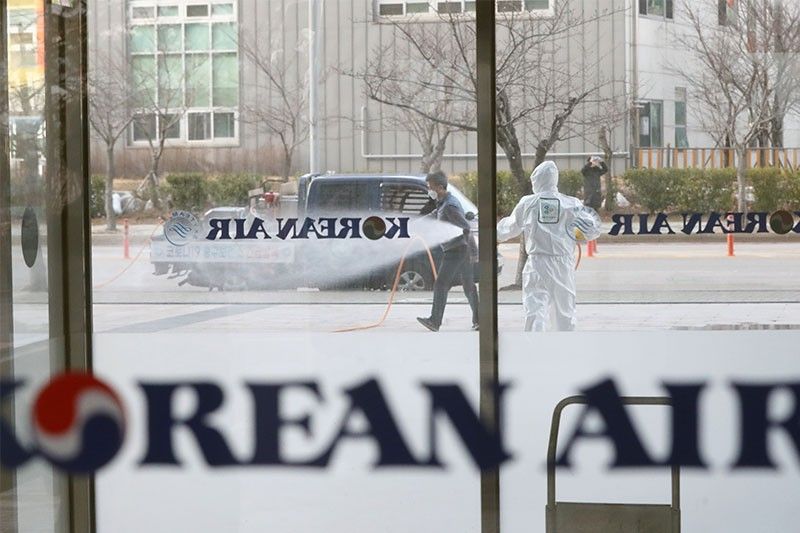Sans guidelines, Philippines struggles to enforce Korea travel ban

MANILA, Philippines — A day after a travel ban against a South Korea province was announced, major local airlines are forced to take matters into their own hands absent concrete guidelines on how to implement the latest barriers meant to stop the spread of coronavirus.
Justice Secretary Menardo Guevarra told Philstar.com a resolution on the ban from the interagency task force against infectious diseases will be released “maybe tomorrow (Friday).” The schedule of the document release is crucial, as immigration officials grappled for clues on how to enforce a travel ban against North Gyeongsang absent a written directive.
Without a signed order, the most Dana Sandoval, spokesperson for the Bureau of Immigration, could say was that the ban is “pending full implementation.” “We are awaiting the copy of EID resolution as well as clarification on how to target arriving passengers,” she said in a statement.
This has left flight management in disarray. While flag-carrier Philippine Airlines (PAL) has stopped accepting people with flight history to Daegu International Airport, which caters to North Gyeongsang, budget airline Cebu Pacific Air continued to service customers from the area.
“There is no directive yet from Philippine government,” Charo Lagamon, director for corporate communications at Cebu Pacific, told Philstar.com when asked if the airline is already implementing the travel ban.
Separately, AirAsia said in a statement it is “[working] closely with government and airport authorities for us to be able to comply with the travel ban.”
“As announced by (the Philippine government), those coming from North Gyeonsang Province or Gyeongbuk, including Daegu and Cheondo County, will not be allowed to enter the Philippines,” the company said.
Tracking problems
North Gyeongsang lies around three-hour drive south of Seoul and is the epicenter of the Coronavirus Disease-19 (COVID-19) outbreak in South Korea. As of Thursday, nearly 1,600 people have been confirmed infected in the country, the Philippines’ top source of foreign visitors over the past five years. South Korea has the largest case of COVID-19 outside China.
No local airline services Daegu directly, but anyone with travel history to the area are not permitted in. This is where immigration officials are having a problem. Typically, airlines ask passengers to make self-declarations like that of PAL, but such mechanism is not fool-proof.
“We have forms which passengers are required to fill out with their travel history. Of course, you can only rely on the passengers being honest,” Villaluna said.
BI’s Sandoval said this is where assistance from Korean officials may come in. Justice Undersecretary Markk Perete said a meeting with the Korean Embassy is set tomorrow to discuss the travel ban.
“The interagency task force on emerging infectious diseases will be coordinating with Korean authorities on issuing certification to distinguish if a passenger is coming from said areas of concern,” she said.
In any case, officials are hoping travel history declarations will come useful to better implement the ban. While no local airline services Daegu directly, Jeju Air and T-way Air have daily flights connecting Daegu with Kalibo and Cebu. BI said the two airlines voluntarily suspended those routes since February 18.
Passengers from Daegu may also try fly from Incheon, the main airport, where PAL has flights 14 times a week and AirAsia double that. Cebu Pacific, which has not enforced the travel ban pending guidelines, have 40 flights a week to and from Incheon.
AirAsia also services Incheon through Clark International Airport six times a week, Cebu 20 times a week, and Kalibo 28 times weekly. The airline also goes to and from Busan, eight times a week.
“Passengers whose travel movements are traceable to the affected province are included in the ban,” Guevarra said.
Filipinos banned in Korea
Pending the guidelines, Sandoval said what BI has started implemented was the prohibition against Filipino tourists on flying to South Korea.
The travel ban against some South Koreans added another layer of uncertainty for the local tourism industry, whose last year's stellar performance is already at risk of getting stalled due to existing travel prohibitions to and from China, the country's second largest tourism market, as well as Chinese territories, Hong Kong and Macau.
Government data show South Korea has been the Philippines' largest tourist source for the past five years, with last year alone seeing about 1.9 million Koreans flying in, equivalent to 24% of total foreign visitors. -with Kristine Joy Patag
READ: Asia-Pacific airlines could lose $27.8 bn to coronavirus: IATA
- Latest
- Trending































